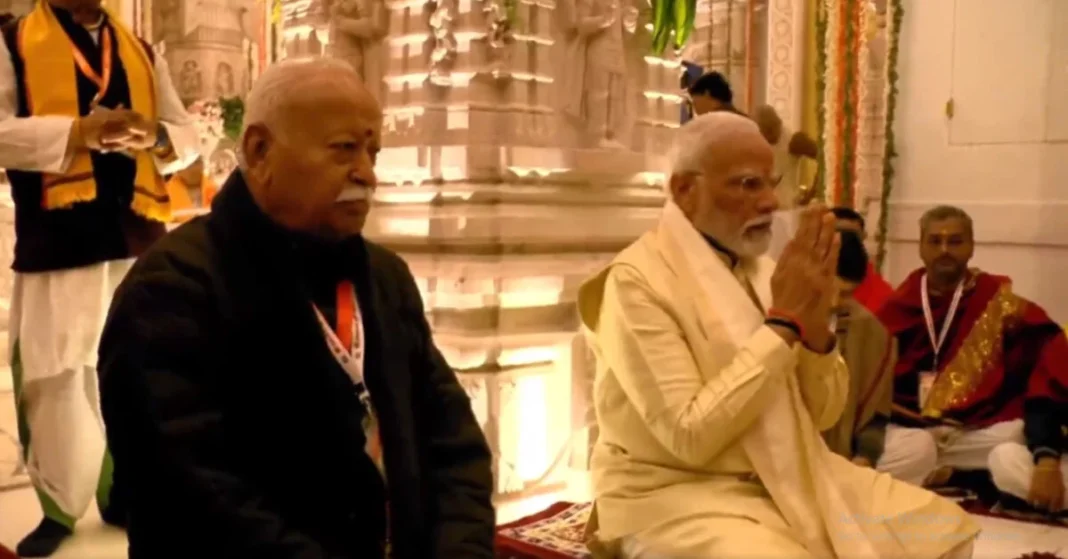Anwarulhaq
New Delhi: Prime Minister Narendra Modi has inaugurated the Ram temple on the site of a 16th-century mosque that was demolished by Hindu hardliners in 1992. The ceremony, dubbed “Pran Pratishtha,” saw the installation of a 51-inch Ram Lalla idol in the newly built sanctum sanctorum. Thousands of invited guests, including celebrities, industrialists, and officials, attended the event, which was broadcast live to millions across India. RSS chief Mohan Bhagwat, UP Governor Anandiben Patel, and Chief Minister Yogi Adityanath also attended this Hindu ritual event.
The partial opening, with only the ground floor accessible, fuelled criticism from some, questioning the BJP’s motives. Prominent Hindu gurus and most opposition parties boycotted the ceremony, accusing Modi of weaponizing the temple for political gain with upcoming elections looming. The scars of religious violence and the long legal battles over the site cast a long shadow on this ceremony.
Meanwhile, the Muslim community in Ayodhya, with a population of around 500,000, expressed apprehension about the event. The 16th-century Babri Masjid, demolished by Hindu mobs in 1992, triggering nationwide riots, remains a fresh wound in their collective memory. Anxieties resurfaced, boiling over into fears of targeted violence, exclusion, and marginalization under the regime.
“We can’t afford to lose our belongings, savings, or even identity papers anymore,” confided a young Muslim man, capturing the pervasive sense of vulnerability. Another echoed his concern, “Outsiders might demand our expulsion from Ayodhya or call for a Hindu Rashtra.” The wounds of exclusion and marginalization under the BJP government deepen the fear.
A prominent US-based Hindu group has accused Indian Prime Minister Narendra Modi of “weaponizing” Hinduism and using the Ram Temple for political gain. Hindus for Human Rights (HHR) said in a statement that Modi’s decision to preside over the Ram Temple consecration ceremony is a “blatant attempt to exploit religious sentiments for political ends.”
“The Ram Temple is being built on the ruins of a sacred medieval mosque destroyed by a Hindu nationalist mob, on a long contested holy site in India,” it said.
HHR also raised objections to Modi’s qualifications to lead the ceremony, saying that he is not a religious leader and that a Hindu temple cannot be consecrated before it is completed.
The 2019 Supreme Court judgement that paved the way for the temple’s construction also allocated land for a new mosque, 25 kilometers away. But for Mahboob Ansari, a petitioner in the case, the distance and lack of progress on its construction feel like another injustice. He laments, “If it was closer, we could feel less marginalized.”
Despite past instances of interfaith harmony, a young man sadly states, “Now, there’s more poison in the air.” The sense of isolation and insecurity is palpable.
Even with assurances from the administration about maintaining peace and security, many families have sent women and children away for safety. Local Muslim organizations have petitioned authorities for heightened vigilance in Muslim-dominated areas, especially those scarred by the 1992 riots.
A special police task force and the CISF have been deployed to secure the temple complex and the newly inaugurated airport. However, Mohammed Azam Qadri, president of the Sunni Central Waqf Board in Ayodhya, emphasizes the need for tighter security within residential areas. “Those who experienced past violence live in constant dread,” he explains.
Beyond Ayodhya, across northern India, social media and public spaces are flooded with celebratory sentiments from the majority community. However, these celebrations often translate into animosity and prejudiced discourse directed towards Muslims.
In fear of further provocation, Muslims in several states are advising each other to stay home, avoid travel, and maintain utmost caution on January 22nd. It’s a self-imposed curfew, a day of silent apprehension while the festivities for the ‘reclaimed land’ rage on.
Amidst these celebrations, it’s crucial to acknowledge the fear and marginalization experienced by Ayodhya’s Muslims. The road to healing cannot be paved while ignoring their anxieties.

